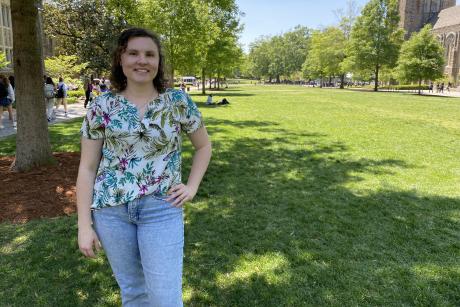
Nunn’s United States and Malagasy team collect health data in Mandena, Madagascar
Published September 25, 2015 under Education News
Bass Connections, a university-wide initiative that brings together students and faculty to explore real-world issues, is soliciting proposals from Duke faculty members for new project teams starting in summer 2016 or the 2016-17 academic year.
Launched in 2013 with a $50 million gift from Anne and Robert Bass, the program connects students of all levels from a wide range of disciplines with faculty-led projects centered around one of five themes:
- Global Health
- Brain and Society
- Information, Society and Culture
- Education and Human Development
- Energy
Project teams have produced peer-reviewed journal articles, conference presentations, websites, mHealth interventions, and educational materials. Bass Connections projects last between three and 18 months.
Brief History of Bass Connections in Global Health
Since its inception, Bass Connections has sponsored more than 110 teams, with an average award of $20,000.
Nineteen of these teams, including 56 project leaders and 100 student participants, were funded or co-funded through the global health theme. These projects have spanned 14 different countries, including India, Madagascar, Honduras, Bangladesh, Jordan and the United States.
Recent Global Health-Themed Projects
This summer evolutionary anthropology and global health professor Charles Nunn led a team that explored the concept of evolutionary mismatch—when current lifestyles differ from the lifestyles in which humans evolved—and its consequences for human health. This project is part of Nunn’s broader effort to advance interdisciplinary research in the new field of evolutionary medicine.
This past spring, the team reviewed research on evolutionary mismatch in a global health context and planned their research in Madagascar. Then, in the summer, they collected data in the village of Mandena, where transitions in diet and behavior are leading to an increase in chronic Western diseases and musculoskeletal injuries and pathologies.
“Building a Bass team was a great way to get started with a new research project and find areas of overlap with other Duke faculty,” Nunn said. “The vertically-integrated nature of the teams helped foster team chemistry and gave ownership of different projects to different individuals, while bridging the different projects based on the varying knowledge and skills of the undergraduates, graduate students and a postdoc.”
Nunn’s team included second-year Master of Science in Global Health student Melissa Manus and undergraduate global health major Taylor Trentadue.
Other 2015-16 Bass Connections in Global Health projects include:
- Community care of frail elders in cross-cultural settings (China)
- Generosity and gratitude: Mechanisms, models and motivations of living kidney donation (United States)
- Integrative global research on sickle cell disease (United States, Jamaica)
- Environmental epidemiology in Latin America: Leishmania (Peru)
- Developing the implementation of a distance-based executive-style degree completion program for Ghanaian nurse anesthetists (Ghana)
- Interculturally competent analysis of the uptake of routine vaccination services and mobile phone use (Ghana, Honduras)
Learn More
- Learn more about Bass Connections
- Learn more about Bass Connections in Global Health
- Submit a proposal (due November 6, decisions to be made by December 18)


